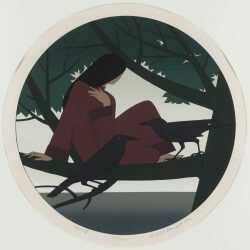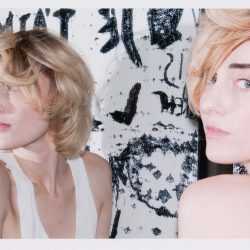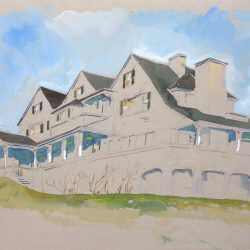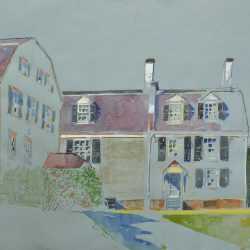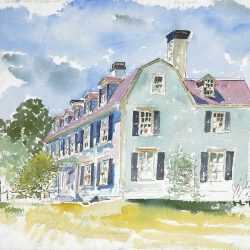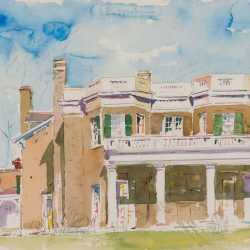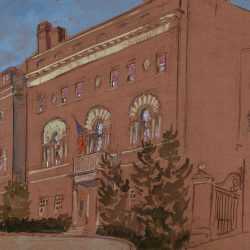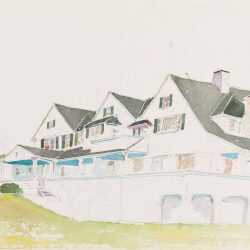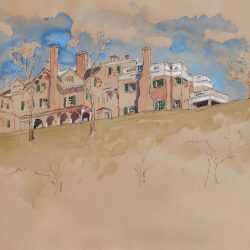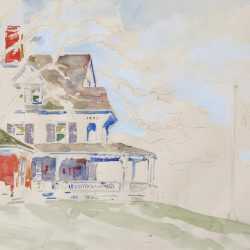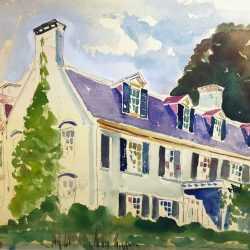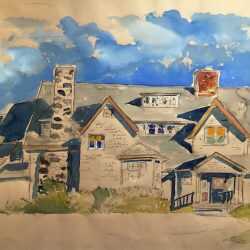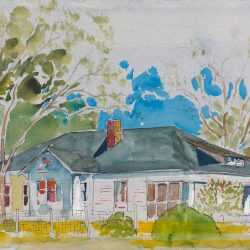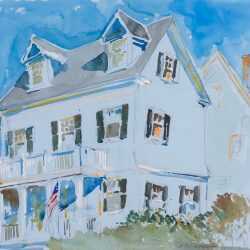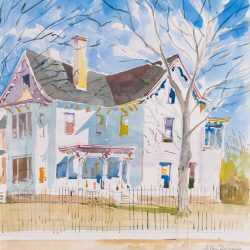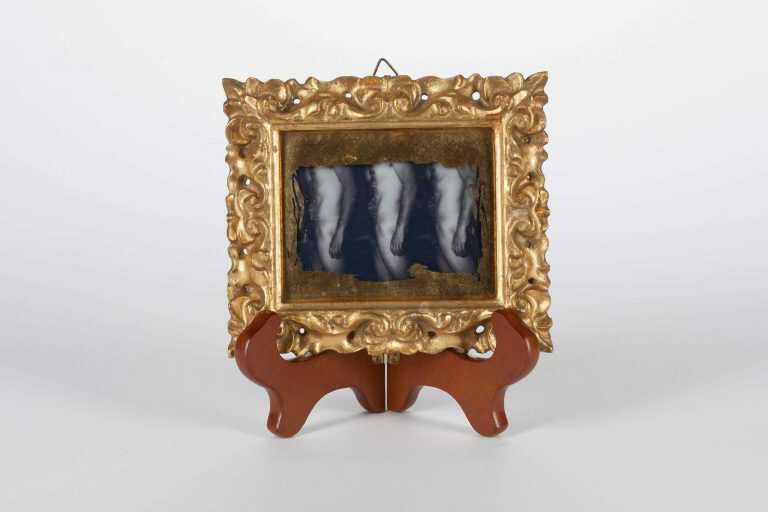Filter by Type
Filter by Category
Filter by Size
Filter by Year
Exhibitions
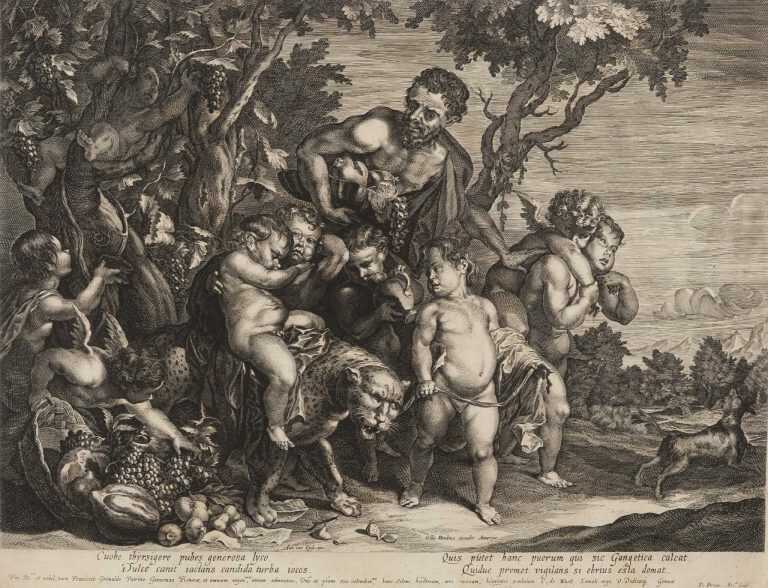
A Feast for the Eyes: Drinking and Dining Culture in Art – Online Exhibition
Press Release:
From Old Master prints to contemporary paintings, A Feast for the Eyes examines drinking and dining culture through various media of art. The exhibition features work by Milton Avery, Marcantonio Raimondi, Paul Endres Jr., Sally Michel, Hannah Barrett, Jared French, Dudley Vaill Talcott, and more. The online-only exhibition will be on our website April 25 through May 25.
Included Works
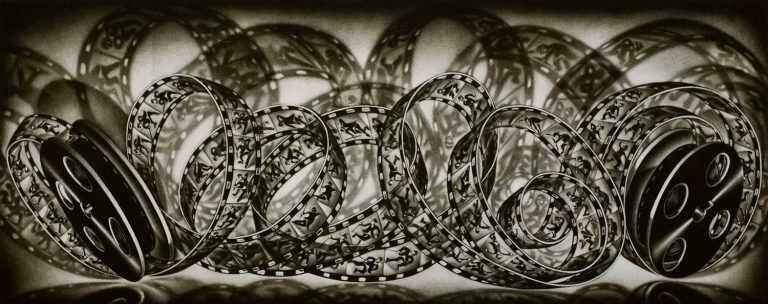
Contemporary Ink: 21st Century Women Printmakers – Online Exhibition
Press Release:
In celebration of Women's History Month, Childs Gallery presents our first ever online-only exhibition, Contemporary Ink: 21st Century Women Printmakers. Featuring works by Emily Lombardo, Ambreen Butt, Christiane Baumgartner, Sara Zielinksi, Joan Hall, Carol Wax, Resa Blatman, and more, the exhibition presents a variety of printmaking media beautifully executed through the skillful hands of a diverse group of artists.
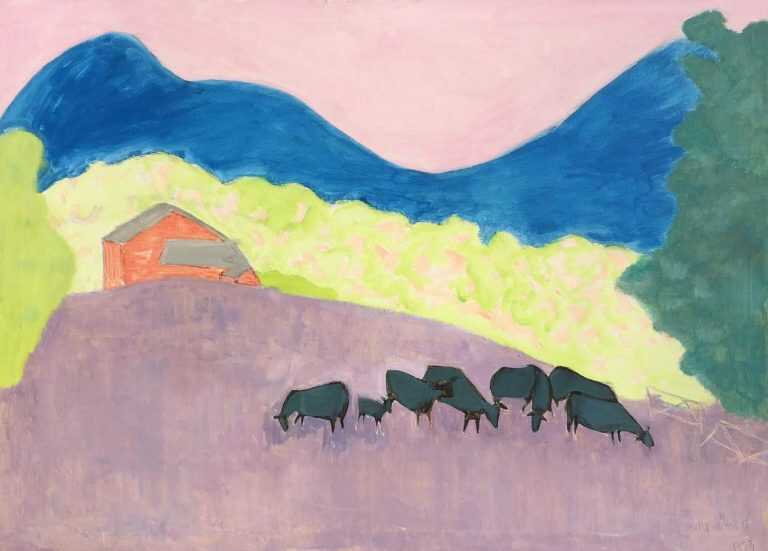
Sally Michel: Idyllic Moments
Press Release:
Sally Michel’s paintings exude a joyfulness indicative of a life well-lived. Drawing inspiration from her immediate surroundings, Michel’s work primarily focuses on her intimate world: landscapes glimpsed on vacations, domestic scenes with friends and family, and charmingly irreverent everyday objects found at home and abroad.
Michel painted in a distinctive style of simplified shapes and lively colors, developed during the long collaborative career between herself and husband, Milton Avery. Michel and Avery met during a summer spent painting in Gloucester, Massachusetts in 1924. At the end of the summer, Avery followed her back to New York where Michel was studying at the Art Students League, and two years later, they were married. While Avery pursued painting fulltime, Michel was the family breadwinner, working in commercial art and illustration to make ends meet. She painted only when time allowed and in doing so, created work reflective of her appreciation for both the playful and the domiciliary.
In the 1930s the Averys befriended fellow New York artists Mark Rothko, Adolph Gottlieb, and Barnett Newman. The group would vacation and paint together, often discussing art theory and critiquing one another’s works. Though Rothko, Gottlieb, and Newman would go on to become amongst the foremost Abstract Expressionists, the Averys never abandoned the representational aspect of their art. They instead forged ahead into a new kind of Modernism, reinterpreting color, line, and form to render recognizable, yet abstracted images.
Throughout her career, Michel crafted an oeuvre that conveys moods and emotions. Her paintings alternatively feel cozy, quiet, lively, happy, content, and humorous depending on the scene. Whatever the image, Michel’s work often focuses on relations, be it between people, animals, or objects, and explores the various feelings inherent in such connections. Bottle Baby and Untitled [Heron and Her Young] both display the maternal affection between mothers and their young. Untitled [Woman with Outstretched Arms and Doves] captures a whimsical moment outdoors between a smartly dressed woman and a flock of birds. Bathers by the Stream envisions a family sojourn beachside, some figures simply enjoying the sun while others venture into the water. In each piece, Michel plays with her figural groupings to elicit an emotional response in her viewers. The general feeling of each piece is an overwhelming pleasantness, engendered by Michel’s creation of cheekily colored bucolic worlds populated by friends and family.
Michel’s work, however, cannot be reduced to merely pretty hues and agreeable subjects. Her simple shapes and flattened planes demonstrate a hand adept at form without the need for over description. It is these lines and shapes that beckon the eye to linger within her paintings, to follow along and distinguish various figures and their spatial relation. The pleasing, if unusual, colors then allow one to idle within the picture plane, while the emotional levity invites further stay.
Michel was modest about showing her paintings and watercolors until much later in life. In painting for her own sake rather than the art market, she was able to craft work that manifests a playfulness born from the small, everyday occasions in life. Idyllic Moments explores both Michel’s world and persona through her artwork, revealing a character of infectious passion and talent. Michel was a mother, wife, friend, adventurer, and above all else, artist, intent on sharing her joie de vivre with the world.
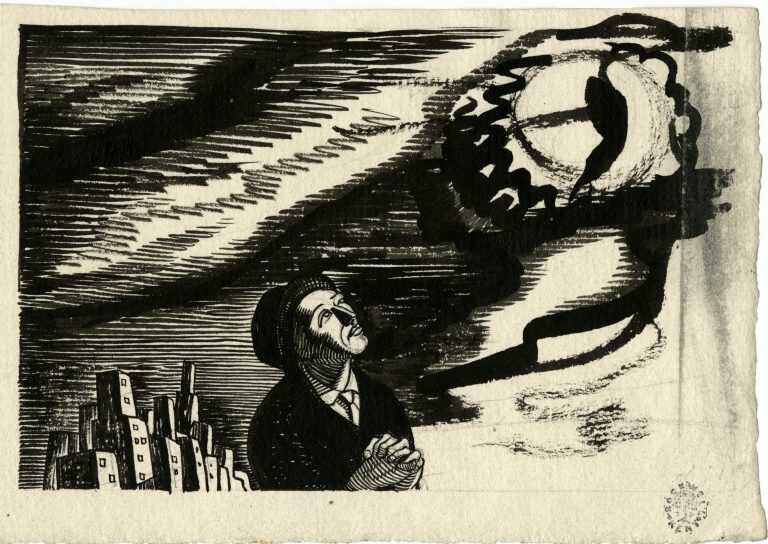
Graphic Prose: Illustration Art of the 19th & 20th Centuries
Press Release:
From Childs Gallery’s repository of works on paper, Graphic Prose: Illustration Art of the 19th and 20th Centuries, is an exhibition focused on fine prints and drawings originally created to be produced in books, magazines, posters, and advertisements. Historically, the art of illustration is closely linked to the processes of printing and publishing, which rapidly became more efficient and economical during the 19th and 20th centuries. In presenting a wide range of illustrations from this period, Graphic Prose not only explores these technological advances but also the social history and artistic styles of these periods.
By the early 19th century in Europe, printing technologies substantially improved reproduction quality, and a concurrent changing political climate resulted in demand for publications and imagery circulating political and social commentary. Notable illustrators of the early 19th century included George Cruikshank, Thomas Rowlandson, and Honoré Daumier, who contributed immensely to their respective British and French Satire genres through popular journals. Highlighted in Graphic Prose, are fine examples of each artist’s caricatures encapsulating social mores, types, and classes, through finely hand-colored prints.
In America, mechanization and production led to the “Golden Age of Illustration,” a period of unprecedented excellence in book and magazine illustration in the late 19th and early 20th centuries. A small group of illustrators became highly successful, among them James Montgomery Flagg, William Ladd Taylor, and A.B. Frost, all represented within this exhibition. Images created by the illustrators of this “Golden Age” often became standards for the visualization of characters, fashions, and lifestyles which entered the collective consciousness of popular culture. The zeitgeist for published materials, books, magazines, fashion plates, and advertisements wielded increasing power on social and political stages by reaching an ever-expanding audience eager to digest new sights and new ideas.
Because of their technical execution, creativity, context, and the purpose of their commission, the individual works selected in Graphic Prose are poignant expressions of the dynamic times in which they were created. Spanning two centuries of illustration, the exhibition features varied artists including Rockwell Kent, Everett Shinn, William Hogarth, Félix Buhot, Bernard Brussel-Smith, Thomas Starling Sullivant, Jared French, Fritz Eichenberg, and others, offering an expansive look at this continually popular genre of art.
On display in Childs Gallery’s Print Room, Graphic Prose: Illustration Art of the 19th and 20th Centuries will run concurrently with National Reading Month. The exhibition is on view February 28 through May 24, 2019.
Included Works
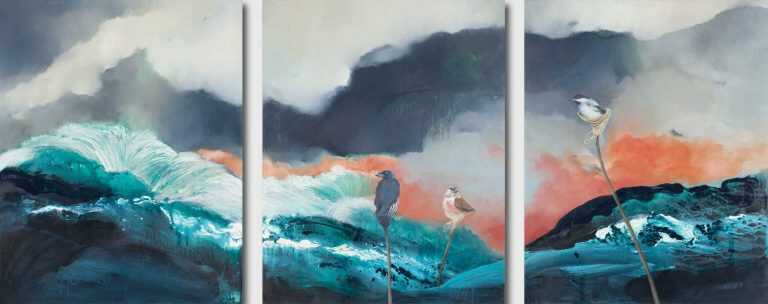
Resa Blatman: Dark Sea
Press Release:
Inspired by nature and climate change, Resa Blatman's Dark Sea addresses the effects of human interaction on the natural world. Works in dazzling colors present an ethereal view of ocean life, while more ominous elements hint at a future endangered by rising tides, oil spills, and pollution. The exhibition will be on view in the Childs Gallery Print Department and features many pieces from Blatman’s well-received installation of the same name, recently shown at the INK Miami Art Fair.
Blatman’s undulating visions of sea life are calm, yet unsettling. The tranquil swirling forms of her mixed media works belie the dangerous changes facing our natural world. Her clever use of dimensionality and bold, innovative materials create scenes into which the audience is drawn and afforded the opportunity to contemplate their own impact on the planet.
Through paintings, prints, and drawings, Blatman’s artistic narrative speaks of an uncertain future. In her oil Refugees, anxious birds perch atop spindly branches, set against the roiling waves of a “water world.” Gold and copper leaf add a lush, delicate quality to her hand-altered etchings, but take on forms resembling pollutants amorphously pouring through ocean waters. Her drawings feature corals combined with organic lines that represent both sea life and floating ocean debris.
The works in Dark Sea contain a lyrical, dark, and mysterious beauty that is reflected in nature and humanity. Presented together, they beautifully demonstrate the tragic and overwhelming consequences of climate change on our planet.
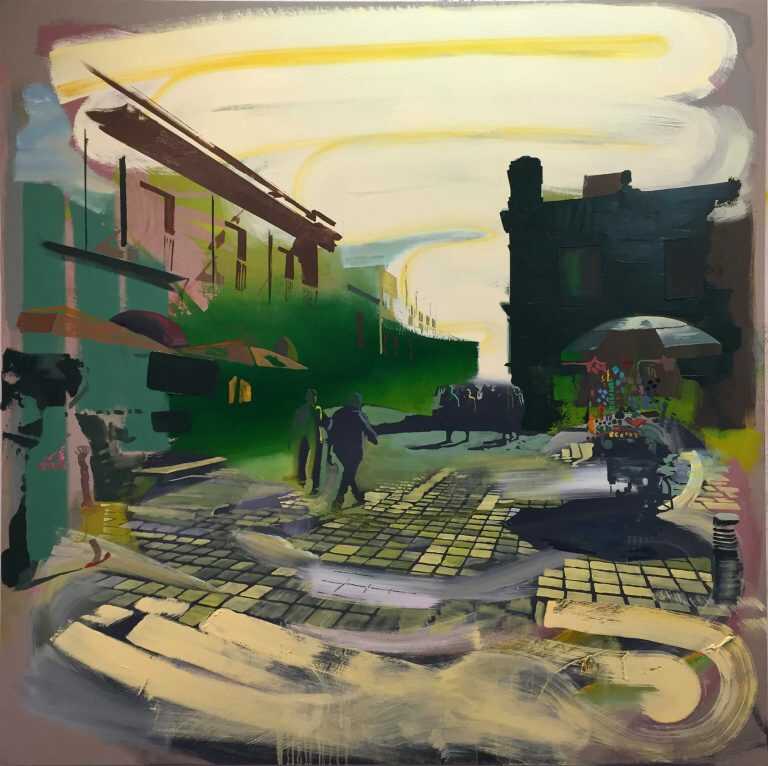
Andrew Fish: In the Memory Palace
Press Release:
The fleeting feeling of Andrew Fish’s artwork is intentional. Concerned with the ubiquity of picture-making and -taking in our society, Fish’s work explores the ephemeral nature of technology-based images through the blending of traditional media and contemporary digital motifs. In this exhibition, the artist examines human memory in the context of the digital age. Memories shape our recollection and understanding of the past, but they are constantly changing. We forget, revise, or misremember, much as we delete, alter, and manipulate digital images. In an age where ubiquitous imagery is so easily edited, what we remember, even how we remember, seems to be constantly in flux.
A “memory palace” is a mnemonic enhancement technique dating back to ancient Greece, in which spatial visualization is used to recall information. According to Roman authors Cicero and Quintillian, the Greek poet Simonides invented the technique when asked to identify the remains of dinner guests after the roof of their banquet hall collapsed. Simonides, an earlier guest of the fateful party, used his visual memory to recall the seated position of each diner.
With this body of work, Fish plays with the memory palace concept: faceless, shadowy figures inhabit equally immaterial worlds. In creating a series of images of obscure locations, his artwork summons memories that will be unique to each viewer. Fish conjures places that feel familiar but lack the recognizable features of photographs and maps, and omit details observed in the present moment. In doing so, his scenes invite immersion, yet simultaneously feel as if they are moments slipping away in time.
In these paintings, as in his previous works, Fish reacts to the immediacy of digital photography and social media imagery but strips away their transitory qualities by engaging in the lengthier, more permanent processes of painting and printmaking. Through the abstraction of pervasive contemporary pictorial motifs, Fish documents our societal obsession with related technologies in a painterly fashion. He also addresses the question: How can an artist respond to, and find relevance in, this kind of environment? In the Information Age, with so many images at our fingertips, Fish’s work asks the viewer to consider their relationship with the content creator, as well as the relationship between the ephemeral and the permanent. Memories, constantly mutating, lie at the intersection between what is ephemeral and what lasts over time. We are constantly forgetting, just as we are constantly replacing digital images with new ones, and yet some images persist in their familiarity and resonance.
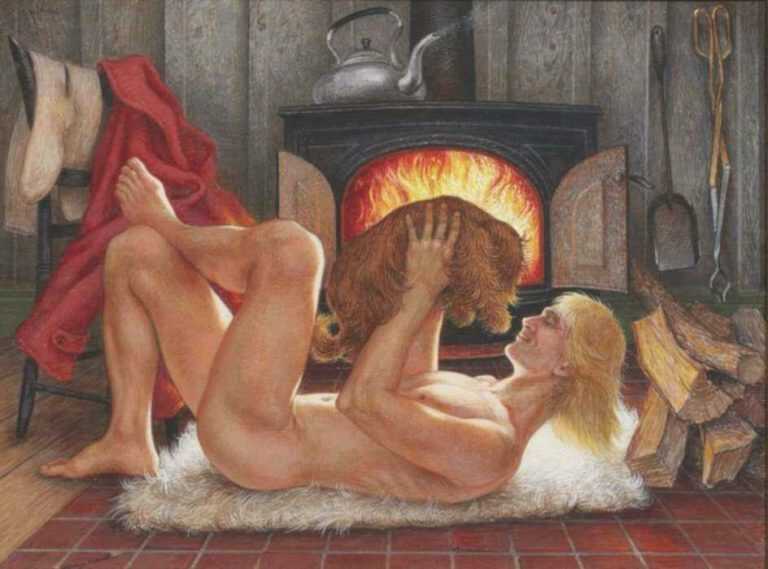
Model and Muse: Intimate Connections
Press Release:
In Classical Antiquity, inspiration was dependent upon the nine Muses, goddesses and daughters of Zeus presiding over the Arts and Sciences whose invocation bestowed divine creativity upon their acolytes. The term “muse” has since become synonymous with an individual who similarly inspires another. There exists a long tradition within the Fine Arts of muses, men and women whose looks, personalities, and attitudes encourage bursts of prolific creative energy. Often this relationship between artist and muse is, or becomes, intimately familiar. Lovers, spouses, children, and friends have all been sources of great inspiration as subjects within an artist’s oeuvre.
Focusing on pieces from the early 20th century to the present, Model and Muse: Intimate Connections reflects upon the fascinating and complicated relations between an artist and their inspiration. In works by Paul Cadmus, such as Winter #2 and NM 166, the artist’s master draftsmanship of the human form is apparent. Perhaps more rewarding, however, is viewing these pieces with an understanding of the familiar intimacy with which Cadmus crafted the images of his model and lover, Jon Anderson. The easy sense of comfort gleaned from Sally Michel’s paintings Brunette and Untitled [Seated Woman] comes from her use of friends and family as models in charmingly domestic scenes. Circe II, a serigraph by Will Barnet, features the artist’s wife Elena in silhouette. Barnett first sketched his wife’s silhouetted figure early in their marriage during a trip to Maine. Elena, and the pose, became mainstays in Barnet’s art, and suffuse his most famous works with a strength and fondness found within marital bonds.
The exhibition will also feature works by R. H. Ives Gammell, Milton Avery, George Platt Lynes, Moise Kisling, Michael Bergt, Mark Beard (Bruce Sargeant), and Alexander Brook, among others. In Model and Muse: Intimate Connections, bonds familial and otherwise play out over paintings, prints, photographs, drawings, and sculpture, revealing the intricacies of close working and private relationships.
Included Works
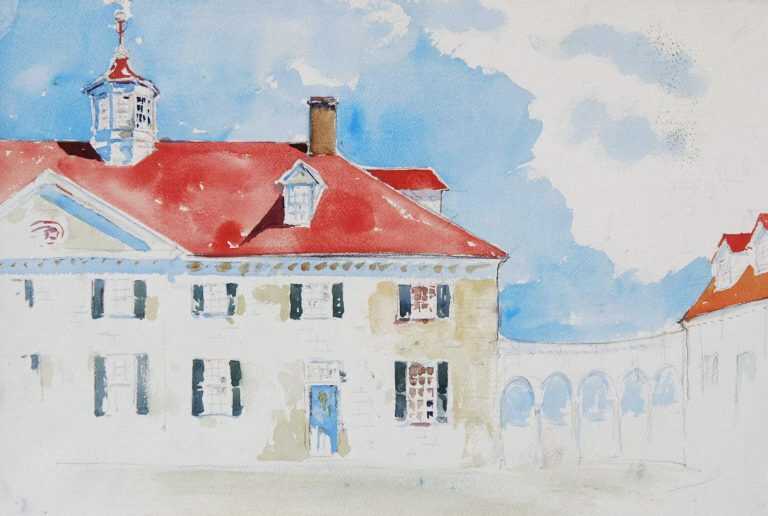
Adam Van Doren: Homes of the American Presidents
Press Release:
BOSTON, MA – Childs Gallery is pleased to announce Adam Van Doren: Homes of the American Presidents, an exhibition of watercolors by the artist and author. Featuring vibrant artwork from Van Doren’s book, The House Tells the Story: Homes of the American Presidents, the show explores the famous lodgings of both living Presidents and those from the past. Van Doren visited each house and even corresponded with former Presidents to ensure the details of every home were faithfully recorded in his watercolors.
The homes of George Washington, FDR, and Teddy Roosevelt are included in the exhibition, as well as Thomas Jefferson’s famed Monticello, among others. A trained architect, Van Doren’s watercolors represent the artist’s personal journey across the country to view these homes and understand not just the structures, but their owners as well. By opening the doors of Presidential homes, Van Doren encourages an intimate dialogue between his audience and the past. Through colorful images, he captures both the spirit of these grand houses and those who resided within them.
Included Works
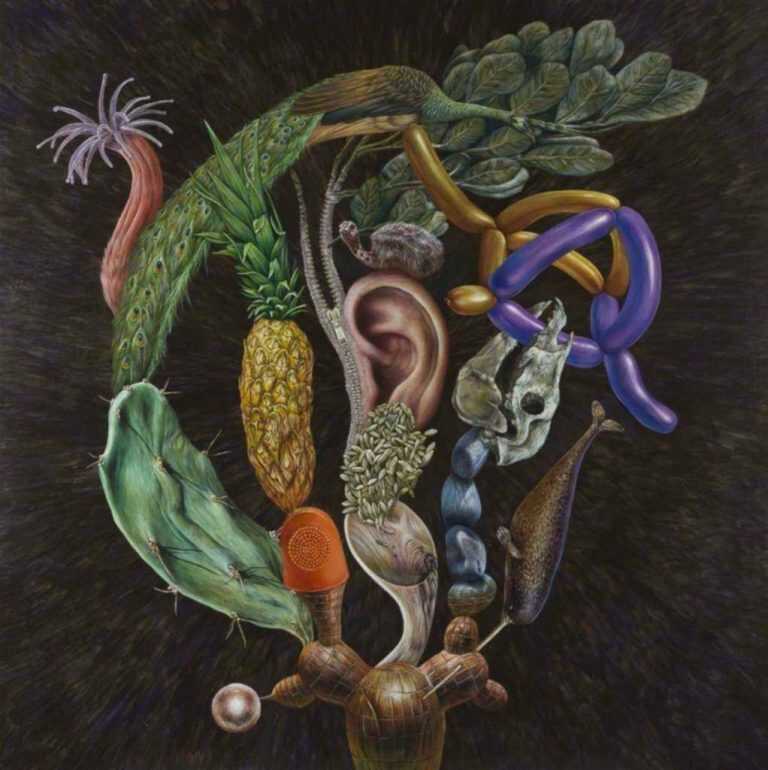
Sawool Kim: Grafted Relics
Press Release:
Sawool Kim’s surreal, dream-like paintings fuse cultural relics with flora, fauna, and everyday objects. Her latest body of work explores transcultural identity through the visual metaphor of botanical grafting, a horticultural technique whereby the shoot of one plant is joined to the stock of another to create new, hybrid growth. Like grafting, transcultural experience can be seen as a process of hybridization – as cultural contact which generates new cultural forms and meanings.
Kim’s interest in transcultural identity is partly a reflection of her own experience; born in South Korea, she has lived and worked in Boston since 2013, graduating from the MFA program at the School of the Museum of Fine Arts in 2016. Her fantastical images are often born from lucid dreams and visual meditations in which objects reveal themselves in a manner not unlike a stream of consciousness narrative. In recording these dreams and meditations, Kim creates a new “visual dictionary,” where seemingly unrelated objects are reclassified as belonging together. The resulting images not only have personal resonance for Kim, but also tap into a larger collective unconscious through the complex use of diverse, but recognizable imagery.
Kim depicts cross-cultural hybridization as a visual grafting of cultural images. Her intricate and interwoven compositions combine relics of different cultures with objects from our own time, visually transplanting these images onto one another to create new meaning. Inspired by her recent travels to South America, the artist incorporates artifacts from Pre-Columbian cultures, including Nazca, Moche, and Chancay ceramics. Kim recontextualizes these artifacts by mentally removing them from their immediate surroundings and hypothesized use. In doing so, she gives each object a new role and function, through which they can then be interwoven with other pieces.
Freed from any preconceived history, time, space, culture, and interpretation, Kim’s relics visually transform, merging with flora and fauna in new, unexpected, and incongruous ways to become pancultural totems of human experience. These couplings can be abrupt and absurd, mirroring the sometimes awkward process of navigating transcultural identity. At the same time, such novel juxtapositions celebrate the transformative power of cross-cultural exchange and the striking originality of hybrid identity, to the betterment of our global society.
The artist will be present at the opening reception, held Thursday, September 6th, from 6 to 8pm.
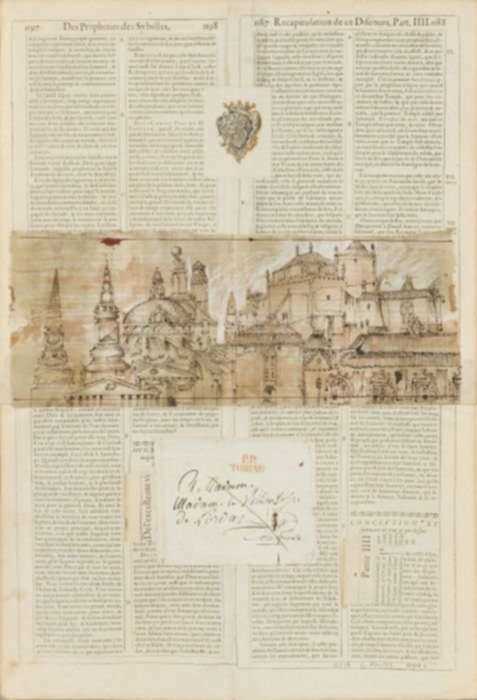
Laurent Hours: History Imagined
Press Release:
Laurent Hours' works blend fantasy and reality into captivating images of people, places, and things that feel pulled from history. The artist’s small-scale mixed media works reveal a whimsical world of ancient cities, mysterious figures, and architectural wonders. Detailed drawings rendered in sepia ink resemble the virtuoso sketches of a great Renaissance mind. The use of handmade papers, handwritten notes, and antique stamps completes the effect, evoking an ancient past that belies the work’s contemporary origins.
Laurent Hours was born in Paris in 1946. From a young age he was surrounded by classical art, having spent much time at the Louvre where his mother was a curator. His pieces can be found in many notable collections, such as the Musée National d’Art Moderne in Paris, the Musée des Beaux-Arts in Bordeaux, the Musée d’Art Moderne de la Ville de Paris, the Musée des Beaux-Arts, Saintes, and the French Embassy in Nairobi, Kenya. He has received numerous awards and distinctions for his artwork, including the Prix Delmas de l’Institut de France in 2007 and the Grand Prix international d’Art Contemporain de Monte Carlo Prix de ICOM (International Council of Museums) in 1980.

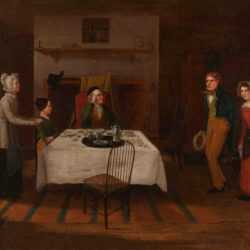
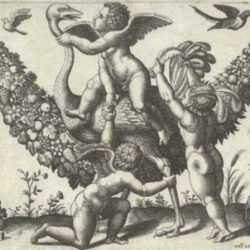
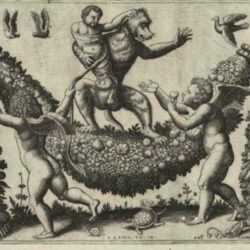
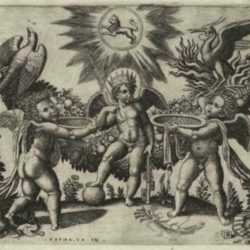
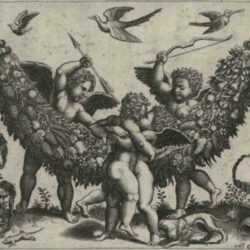
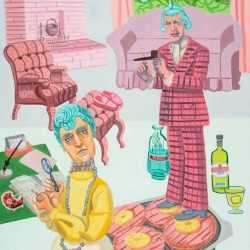
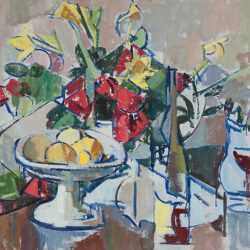
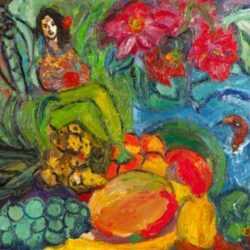
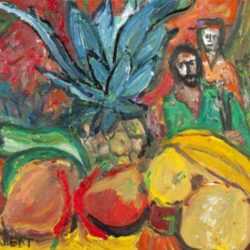
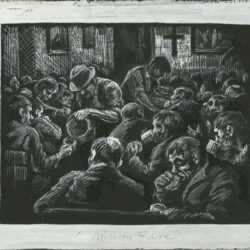
![Print By Jonas Suyderhoef: Drunkenness Of Bacchus [after Peter Paul Rubens, Flemish (1577 1640)] At Childs Gallery](https://childsgallery.com/wp-content/uploads/jonas_suyderhoef_drunkenness_of_bacchus_after_peter_paul_rubens_flemish_1577-1640_bb5502-02_childs_gallery-250x250.jpg)
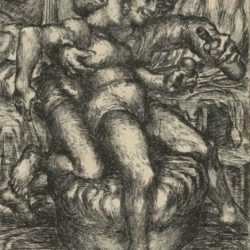
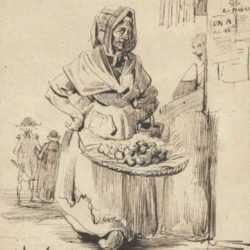
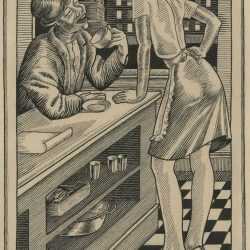
![Print by Georg Pencz: Gula [Gluttony], from The Seven Mortal Sins, represented by Childs Gallery](https://childsgallery.com/wp-content/uploads/georg_pencz_gula__gluttony___from_the_seve_bb1045-06_childs_gallery-1-250x250.jpg)
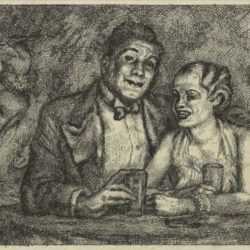
![Print By D. Brunn: Infant Bacchus On A Leopard [after Anthony Van Dyck, Flemish (1599 1641)] At Childs Gallery](https://childsgallery.com/wp-content/uploads/d._brunn_infant_bacchus_on_a_leopard_after_anthony_van_dyck_flemish_1599-1641_bb5502-07_childs_gallery-250x250.jpg)
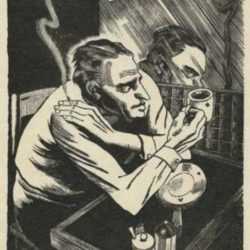
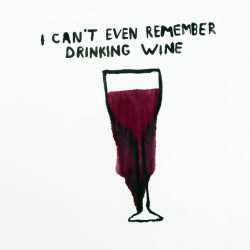
![Print By Continental School (possibly Swiss): [autumnus Baccho] (possibly From Johann Wilhelm Stucki's Antiquatatum Convivialium Libri) At Childs Gallery](https://childsgallery.com/wp-content/uploads/continental_school_possibly_swiss_autumnus_baccho_possibly_from_johann_wilhelm_stuckis_antiquatatum_convivialium_libri_bb5502-08_childs_gallery-250x250.jpg)
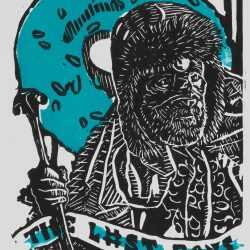
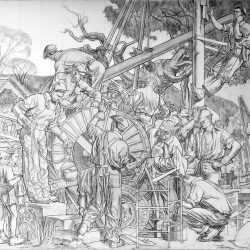
![Print By Fritz Eichenberg: Jane Eyre [woman On Couch] At Childs Gallery](https://childsgallery.com/wp-content/uploads/fritz_eichenberg_jane_eyre_woman_on_couch_94-19-50-2_childs_gallery-250x250.jpg)
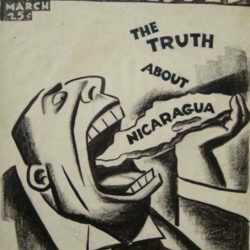
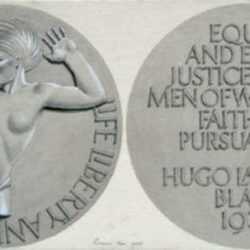
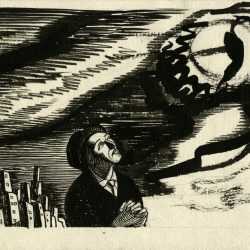
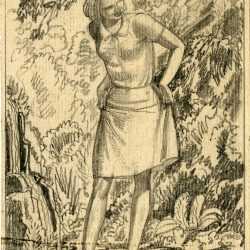
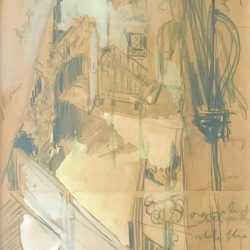
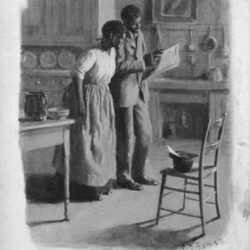
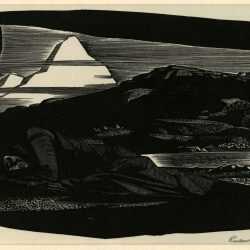
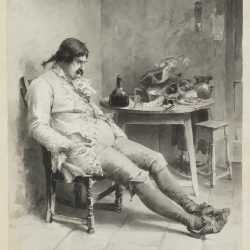
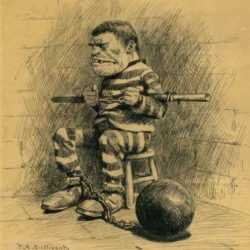
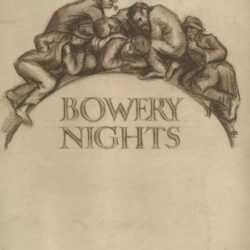
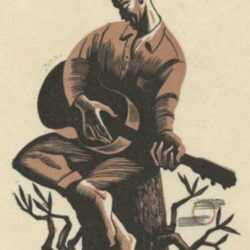
![Print By Thomas Rowlandson: Looking At The Comet Till You Get A Criek [sic] In The Neck At Childs Gallery](https://childsgallery.com/wp-content/uploads/thomas_rowlandson_looking_at_the_comet_till_you_get_a_criek_sic_in_the_neck_17-05-06_childs_gallery-250x250.jpg)
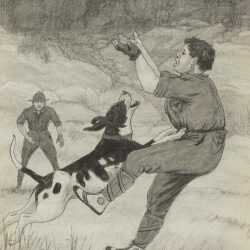
![Print By Edna W. Lawrence: [robin Hood's Merry Men] At Childs Gallery](https://childsgallery.com/wp-content/uploads/edna_w._lawrence_robin_hoods_merry_men_cgl23885-20_childs_gallery-250x250.jpg)
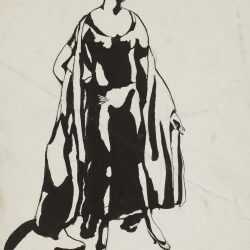
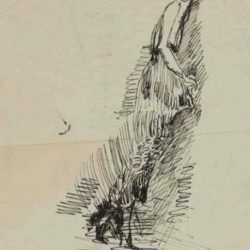

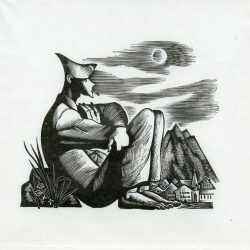
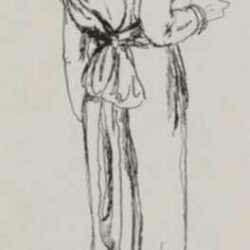
![Drawing By Joseph Pennell: Going To The Riffel [switzerland] At Childs Gallery](https://childsgallery.com/wp-content/uploads/joseph_pennell_going_to_the_riffel_switzerland_cgl55686-20ra_childs_gallery-250x250.jpg)
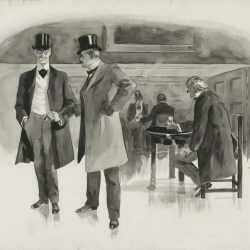

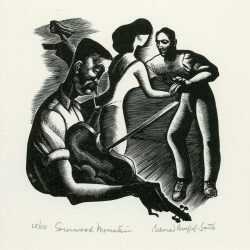
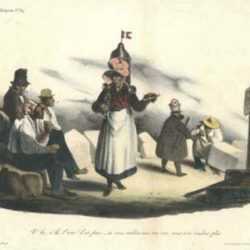
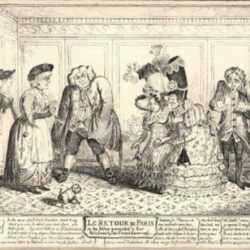
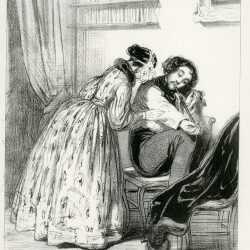
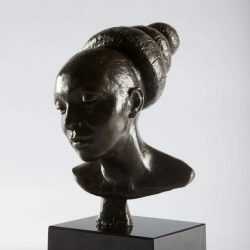
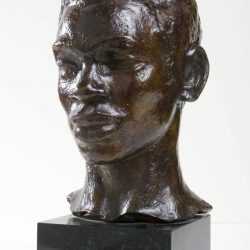
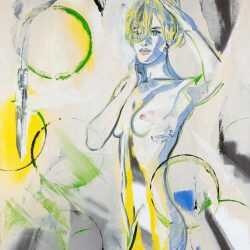
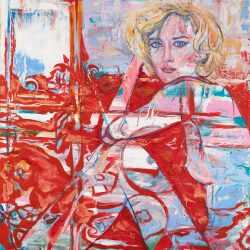
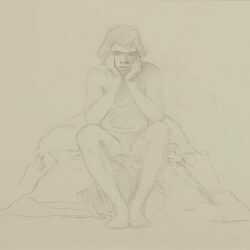
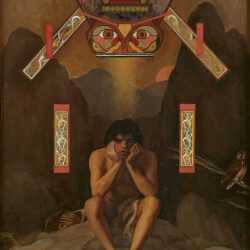
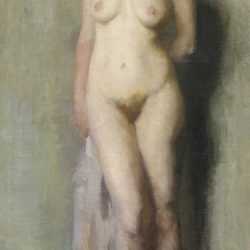
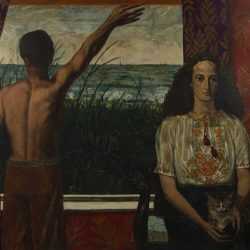
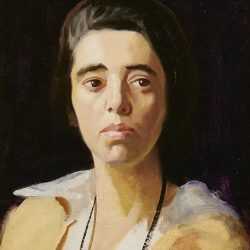
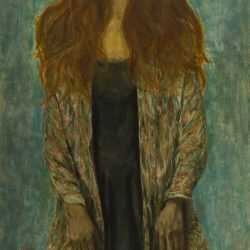
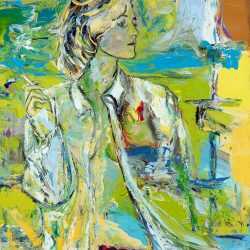
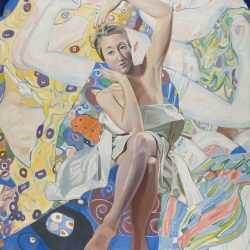
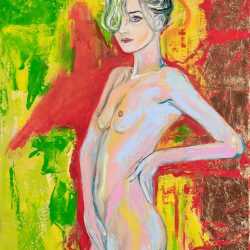
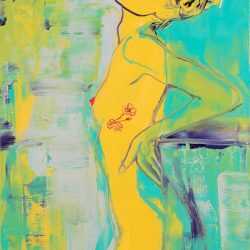
![Painting By Isaac Soyer: [seated Woman In Green] At Childs Gallery](https://childsgallery.com/wp-content/uploads/isaac_soyer_seated_woman_in_green_09-02-007_childs_gallery-250x250.jpg)
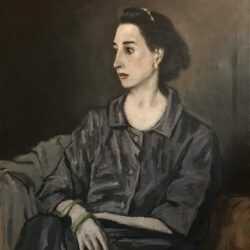
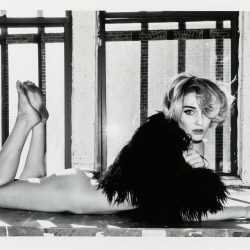
![Painting By William Partridge Burpee: [female Nude With Garland] At Childs Gallery](https://childsgallery.com/wp-content/uploads/william_partridge_burpee_female_nude_with_garland_cgl26343-105a_childs_gallery-250x250.jpg)
